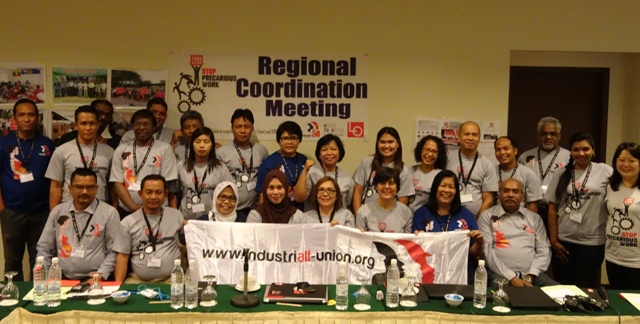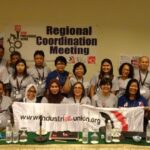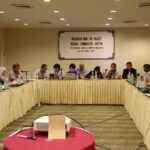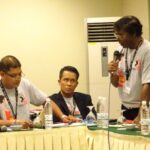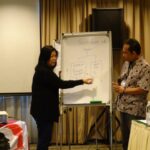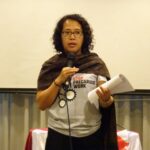Read this article in:
English
12 April, 2017Twenty-one representatives of IndustriALL affiliates from Indonesia, Malaysia, Myanmar and Philippines gathered in Malaysia for the Stop Precarious Work Project Coordination meeting on 3-4 April 2017.
The purpose of the meeting was to share successes and challenges, and develop common action. Despite success in organizing contract workers and influencing government policy, precarious work is growing because employers do not abide by the law.
In Indonesia, core activities should be performed by permanent, direct employees – but employers define what is core and non-core. Indonesian affiliates organized around 19,000 precarious workers last year. In some instances, new unions were formed to negotiate collective agreements separately for outsourced workers. Unions in some companies such as Quantum in Tangerang City pushed for permanent employment status of contractual workers.
Malaysian labour law is good, but enforcement of is ineffective. Unions work to safeguard not only Malaysian workers but also migrants. In some companies, 90 to 95 per cent of contract workers are migrant workers from Nepal, Bangladesh, Vietnam and sometimes Thailand. Although the law prohibits the employment of workers through temporary work agencies, companies still employ migrant agency workers with lower wages and benefits. In some cases, employers withhold workers’ passports. Migrants are reluctant to join unions because their contracts may be immediately terminated.
The National Union of Transport Equipment and Allied Industries Workers negotiated permanent employment for 400 contract workers at DENSO and Robert Bosch.
In Myanmar, there have been no changes despite a new government, because the practices set by the previous government are still implemented. Foreign investors do not follow the law. Land grabbing is rampant in the mining industry, with promises of regular employment and good wages to farmers whose land was confiscated. However, promises are not fulfilled. Often only one member of the family will get a permanent contract, while others have agency contracts with no holidays or no paid overtime.
Through dialogue with the government, improvements are slowly taking place. Since 2014, the 1952 and 1959 labour laws have been reviewed. A new employment contract was introduced in September 2015 by the government. The final version is in the process of endorsement by the Ministry of Labour, and will become the standard contract to be used for making employment contracts nationwide.
The union movement has campaigned for a better contract that promotes security of tenure and is against short-term contracts. The Confederation of Trade Unions Myanmar (CTUM) has encouraged both employers and workers to use the CTUM draft contract as a guideline.
Philippine affiliates have been active in fighting contractualization, making representations in tripartite councils. During his presidential campaign and at the start of his administration, President Duterte promised an end to contractualization, saying that it is anti-people, and warning employers that they will be punished.
However, despite dialogue with the Department of Labor and Employment and the president, and protest rallies, no improvements were made. The situation has got worse with the new Department Order no. 174-2017 of 6 March 2017, which legitimizes the employment of contract workers through contracting agencies.
Trade unions are calling on the president to issue an Executive Order prohibiting the use of contractualization in the country, and will mobilize continually, particularly during May Day.
The meeting adopted a five-year action plan of continuous education, campaigning and organizing, with a gender-balanced regional coordination group to implement it. Target companies were identified. The group will build alliances with other global unions, governments and civil organizations, and conduct skills trainings, organizing and advocacy activities.
